| Listing 1 - 8 of 8 |
Sort by
|
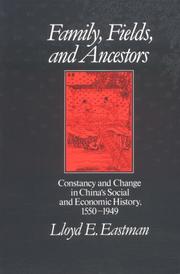
ISBN: 0195052706 0195052692 9780195052695 Year: 1988 Publisher: New York (N.Y.): Oxford university press,
Abstract | Keywords | Export | Availability | Bookmark
 Loading...
Loading...Choose an application
- Reference Manager
- EndNote
- RefWorks (Direct export to RefWorks)
S11/0701 --- China: Social sciences--Clan and family in transition: general and before 1949 --- History of Asia --- anno 1500-1799 --- anno 1800-1999 --- China --- S11/0700 --- China: Social sciences--Clan and family: general and before 1949 (incl. names, clan rules) --- Economic conditions. --- Social conditions. --- Social conditions --- Economic conditions --- Chine --- Conditions économiques --- Conditions sociales --- China - Social conditions --- China - Economic conditions
Book
ISBN: 0192850806 Year: 1979 Publisher: Oxford Oxford University Press
Abstract | Keywords | Export | Availability | Bookmark
 Loading...
Loading...Choose an application
- Reference Manager
- EndNote
- RefWorks (Direct export to RefWorks)
S11/0710 --- S11/0720 --- S11/0730 --- S11/0610 --- S11/0701 --- China: Social sciences--Women: general and before 1949 --- China: Social sciences--Women's emancipation movement: general and before 1949 --- China: Social sciences--Women: since 1949 --- China: Social sciences--Marriage --- China: Social sciences--Clan and family in transition: general and before 1949 --- Sociology of minorities --- Sociology of work --- China --- Working-class women --- Book --- Empowerment
Book
ISBN: 0333253736 0333253728 Year: 1979 Publisher: London Macmillan
Abstract | Keywords | Export | Availability | Bookmark
 Loading...
Loading...Choose an application
- Reference Manager
- EndNote
- RefWorks (Direct export to RefWorks)
S11/0700 --- S11/0701 --- #SML: Joseph Spae --- #SBIB:316.356.2H1133 --- #SBIB:39A11 --- #SBIB:39A75 --- 392.3 --- 316.356.2 --- China: Social sciences--Clan and family: general and before 1949 (incl. names, clan rules) --- China: Social sciences--Clan and family in transition: general and before 1949 --- Hedendaagse gezinsstudies: Azië --- Antropologie : socio-politieke structuren en relaties --- Etnografie: Azië --- Familieleven. Familiesystemen. Gezinsleven. Matriarchaat. Patriarchaat. Kinship --- Gezinssociologie --- 316.356.2 Gezinssociologie --- 392.3 Familieleven. Familiesystemen. Gezinsleven. Matriarchaat. Patriarchaat. Kinship
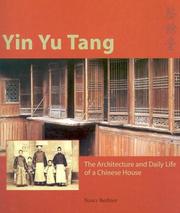
ISBN: 0804834873 Year: 2003 Publisher: Boston Tuttle
Abstract | Keywords | Export | Availability | Bookmark
 Loading...
Loading...Choose an application
- Reference Manager
- EndNote
- RefWorks (Direct export to RefWorks)
Architecture, Domestic --- Vernacular architecture --- Architecture domestique --- Architecture vernaculaire --- Huang family. --- Huizhou Diqu (China) --- Huizhou Diqu (Chine) --- Social life and customs. --- Moeurs et coutumes --- S11/0701 --- S17/1600 --- China: Social sciences--Clan and family in transition: general and before 1949 --- China: Art and archaeology--Architecture --- Architecture, Anonymous --- Architecture, Indigenous --- Architecture, Vernacular --- Folk architecture --- Indigenous architecture --- Traditional architecture --- Architecture, Rural --- Domestic architecture --- Home design --- Houses --- One-family houses --- Residences --- Rural architecture --- Villas --- Architecture --- Dwellings --- Hui-chou ti chʻü (China) --- Huizhou Prefecture (China) --- Hui-chou Prefecture (China) --- Anhui Sheng Huizhou Diqu (China) --- 徽州地区 (China) --- Huangshan Shi (China : Prefecture)
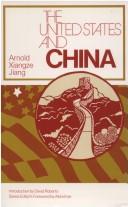
ISBN: 1282069985 9786612069987 0226401944 9780226401942 9780226401874 0226401871 0226401898 9780226401898 6612069988 0226401871 9780226401898 Year: 1983 Publisher: Chicago : University of Chicago Press,
Abstract | Keywords | Export | Availability | Bookmark
 Loading...
Loading...Choose an application
- Reference Manager
- EndNote
- RefWorks (Direct export to RefWorks)
Kay Ann Johnson provides much-needed information about women and gender equality under Communist leadership. She contends that, although the Chinese Communist Party has always ostensibly favored women's rights and family reform, it has rarely pushed for such reforms. In reality, its policies often have reinforced the traditional role of women to further the Party's predominant economic and military aims. Johnson's primary focus is on reforms of marriage and family because traditional marriage, family, and kinship practices have had the greatest influence in defining and shaping women's place in Chinese society. Conversant with current theory in political science, anthropology, and Marxist and feminist analysis, Johnson writes with clarity and discernment free of dogma. Her discussions of family reform ultimately provide insights into the Chinese government's concern with decreasing the national birth rate, which has become a top priority. Johnson's predictions of a coming crisis in population control are borne out by the recent increase in female infanticide and the government abortion campaign.
Confucianism --- Families --- Socialism --- Women peasants --- Peasant women --- Peasants --- Rural women --- Religions --- History. --- China --- Rural conditions. --- S11/0701 --- S11/0705 --- S11/0720 --- S11/0730 --- #SML: Joseph Spae --- China: Social sciences--Clan and family in transition: general and before 1949 --- China: Social sciences--Clan and family: since 1949 --- China: Social sciences--Women's emancipation movement: general and before 1949 --- China: Social sciences--Women: since 1949 --- women, gender, family, household, china, peasant, revolution, social change, history, politics, asia, equality, communism, leadership, reform, womens rights, feminism, tradition, economics, marriage, kinship, population, birth rate, one child policy, marxism, anthropology, political science, abortion, government, female infanticide, confucianism, socialism, rural, village, nonfiction, land, labor, yenan, soviet, kiangsi.

ISBN: 1856493423 Year: 1995 Publisher: London Zed Books
Abstract | Keywords | Export | Availability | Bookmark
 Loading...
Loading...Choose an application
- Reference Manager
- EndNote
- RefWorks (Direct export to RefWorks)
S11/0720 --- S11/0710 --- S11/0721 --- S11/0730 --- S11/0701 --- S11/0702 --- S11/0731 --- S11/0740 --- S11/1050 --- China: Social sciences--Women's emancipation movement: general and before 1949 --- China: Social sciences--Women: general and before 1949 --- China: Social sciences--Women's emancipation movement: since 1949 --- China: Social sciences--Women: since 1949 --- China: Social sciences--Clan and family in transition: general and before 1949 --- China: Social sciences--Clan and family in transition: since 1949 --- China: Social sciences--Childhood, youth --- China: Social sciences--Sexual life: general and before 1949 --- China: Social sciences--Family planning --- Women --- Women's rights --- History --- Social conditions. --- Government policy --- Social conditions --- Developmental psychology --- anno 1900-1999 --- China --- Rights of women --- Human rights --- Civil rights --- Law and legislation --- Legal status, laws, etc. --- Identity --- Girls --- Biography --- Book
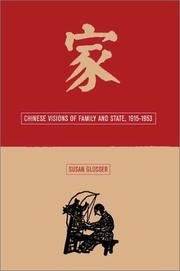
ISBN: 1282758896 9786612758898 0520926390 1597345350 9780520926394 0585467811 9780585467818 9781282758896 0520227298 9780520227293 9781597345354 Year: 2003 Volume: 5 Publisher: Berkeley : University of California Press,
Abstract | Keywords | Export | Availability | Bookmark
 Loading...
Loading...Choose an application
- Reference Manager
- EndNote
- RefWorks (Direct export to RefWorks)
At the dawn of the twentieth century, China's sovereignty was fragile at best. In the face of international pressure and domestic upheaval, young urban radicals-desperate for reforms that would save their nation-clamored for change, championing Western-inspired family reform and promoting free marriage choice and economic and emotional independence. But what came to be known as the New Culture Movement had the unwitting effect of fostering totalitarianism. In this wide-reaching, engrossing book, Susan Glosser examines how the link between family order and national salvation affected state-building and explores its lasting consequences. Glosser effectively argues that the replacement of the authoritarian, patriarchal, extended family structure with an egalitarian, conjugal family was a way for the nation to preserve crucial elements of its traditional culture. Her comprehensive research shows that in the end, family reform paved the way for the Chinese Communist Party to establish a deeply intrusive state that undermined the legitimacy of individual rights.
Domestic relations --- Family policy --- Families --- Families and state --- State and families --- Public welfare --- Social security --- Social policy --- History. --- Government policy --- China --- History --- S02/0200 --- S11/0493 --- S11/0700 --- S11/0701 --- S11/0710 --- China: General works--Civilization and culture --- China: Social sciences--Society: 1911 - 1949 --- China: Social sciences--Clan and family: general and before 1949 (incl. names, clan rules) --- China: Social sciences--Clan and family in transition: general and before 1949 --- China: Social sciences--Women: general and before 1949 --- Familles --- Politique familiale --- Histoire --- Droit --- Chine --- 20th century. --- china. --- chinese culture. --- chinese history. --- civil rights. --- communist party. --- conjugal family. --- economic independence. --- egalitarian society. --- family order. --- family reform. --- government control. --- human rights. --- individual rights. --- marriage choice. --- modern china. --- national salvation. --- nationalism. --- new culture movement. --- patriarchy. --- reform. --- republican era. --- social change. --- sovereignty. --- state building. --- surveillance. --- totalitarianism. --- urban radicals.
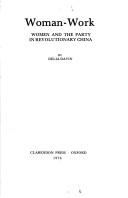
ISBN: 0198272316 Year: 1978 Publisher: Oxford : Clarendon press,
Abstract | Keywords | Export | Availability | Bookmark
 Loading...
Loading...Choose an application
- Reference Manager
- EndNote
- RefWorks (Direct export to RefWorks)
S11/0710 --- S11/0720 --- S11/0701 --- S11/0610 --- China: Social sciences--Women: general and before 1949 --- China: Social sciences--Women's emancipation movement: general and before 1949 --- China: Social sciences--Clan and family in transition: general and before 1949 --- China: Social sciences--Marriage --- Chung-kuo kung ch'an tang --- Women --- Zhong guo gong chan dang --- Chung-kuo kung chʻan tang --- Chūgoku Kyōsantō --- Chungguk Kongsandang --- 中国共产党 --- 中國共產黨 --- КПК --- KPK --- Komunistická strana Číny --- Komunistička partija Kine --- Communist Party of China --- Chinese Communist Party --- Communist Party (China) --- Gong chan dang (China) --- 共产党 (China) --- Коммунистическая партия Китая --- Kommunisticheskai︠a︡ partii︠a︡ Kitai︠a︡ --- Shina Kyōsantō --- Китайска комунистическа партия --- Kitaĭska komunisticheska partii︠a︡ --- Partido Comunista de China --- PCCh --- Parti communiste chinois --- CCP --- Partito comunista cinese --- KPCh --- Kommunistische Partei Chinas --- К.П.К. --- K.P.K. --- CPC --- C.C.P. --- Partia Komuniste të Kinës --- Đảng cộng sản Trung quốc --- Zhong gong --- 中共 --- Pcc --- P.C. Chino --- ХКН --- KhKN --- Хятадын Коммунист нам --- Khi︠a︡tadyn Kommunist nam --- Chung-kuo kung Ch'an tang. --- -#SBIB:328H52 --- Zhongguo gong chan dang --- Zhongguo gong chan dang. --- #SBIB:328H52 --- S11/0730 --- 396 --- 396 Feminisme. Vrouwenbeweging. Vrouw en maatschappij --- Feminisme. Vrouwenbeweging. Vrouw en maatschappij --- Instellingen en beleid: China --- China: Social sciences--Women: since 1949 --- Femmes --- 396 Feminism. Women's movement. Woman and society --- Feminism. Women's movement. Woman and society
| Listing 1 - 8 of 8 |
Sort by
|

 Search
Search Feedback
Feedback About UniCat
About UniCat  Help
Help News
News